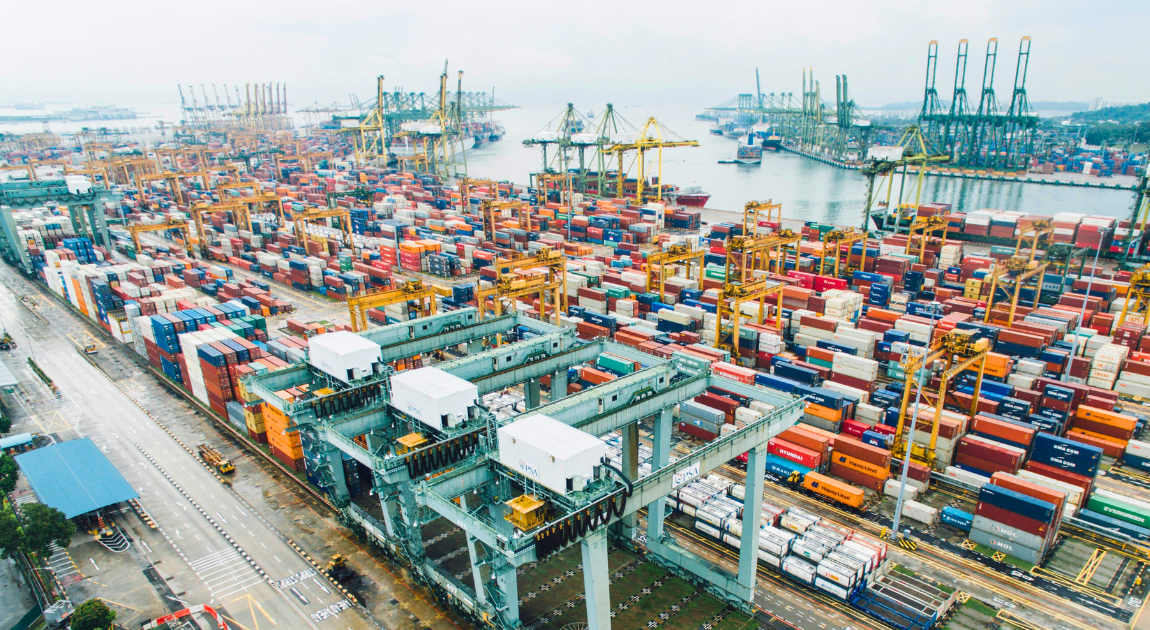We’re often lulled into thinking supply chains are somehow unbreakable, with only occasional moments of anxiety caused by disruptions. Truth is, supply chain management is a vast field of activity, and huge potential for both error and improvement. It’s only natural that industry leaders are experimenting with diverse tech to optimize the various flows and processes, while securing the supply chain and making it more resilient. Here, we explore the ways in which AI in supply chain management allows businesses to address the most problematic aspects of their work and how it’s done.
What is AI in Supply Chain Management?
Since supply chain management itself is a huge bundle of diverse processes, it’s not easy to give a straightforward definition of what AI for supply chain management looks like. In fact, the capabilities of artificial intelligence, especially its power in processing large amounts of data, are used almost everywhere in SCM, from demand forecasting and inventory management to logistics planning. In fact, AI in supply chain management is an umbrella term that covers myriads of solutions that emerged over the past decade, including NLP algorithms, chatbots, robotics systems, and more.
Why Use Artificial Intelligence in Supply Chain Management?
The movement towards adopting artificial intelligence in SCM started in the 2010s as a means of attaining higher efficiency; after 2020, when supply chains were proven to be not as robust as previously hoped, there has been an outburst in adoption spurred by resilience and compliance needs. As of 2023, as many as 60% of leaders in the industry were pro-AI, meaning either already using or planning to adopt it within the next two years.
As hinted above, there still are two main reasons to adopt AI for supply chain management:
- Efficiency and cost reduction by means of automating processes;
- Building resilient supply chains by ensuring transparency, early reaction to disruptions, and avoiding them in the first place.
Let’s look at each in some detail.
Building resilience
The factors that can disrupt supply chains are as multiple as they are diverse, from conflicts and natural disasters to regulatory constraints and market price fluctuations. Sometimes a particular supply chain can disrupt others, since so many business areas are interconnected by now. Algorithms can be made to analyze historical data and detect patterns, forecasting potential disruptions in real-time. Additionally, with AI, companies can map and expand the supplier networks, tracing them further than the typical second-degree suppliers, which is also a beneficial factor.
Achieving cost savings
AI also plays a crucial role in increasing efficiency across supply chains. Through process automation, such as route optimization, warehouse automation, and inventory control, companies can reduce manual errors and speed up workflows. AI-powered tools can dynamically adjust inventory levels, improving stock accuracy by 30% and reducing labor costs by up to 20% , ultimately making the entire supply chain more agile and cost-effective.
Top 5 Areas Where Artificial Intelligence Improves Supply Chain Management
#1 Supply chain mapping and visibility
Supply chain visibility is a matter of both efficiency, resilience, and compliance, so naturally, when there’s a powerful tool like AI, it’s likely to be used for that as a priority. Such AI systems work on different levels, from IoT sensors that track shipments and inventory, to tracking suppliers and the origin of materials and products. All that, paired with predictive analytics, can help identify where the next disruption is more likely to happen and react accordingly, with up to 50% fewer disruptions happening in the first place. An example is Unilever, who map their global (and incredibly hefty, to say the least) supply chain and track it at different stages.
#2 Inventory management
AI can be plugged into inventory management in two potentially problematic places: predicting demand fluctuations to optimize stock levels; and automating processes (like auto-refilling). On average, companies using AI in these two directions report up to 35% better inventory levels. This is especially useful for companies that operate inventories scattered across locations, like Walmart, who adjust stock levels based on real-time customer demand data and supply chain conditions.
#3 Demand forecasting
Naturally, demand forecasting is not just about inventory levels, but business decisions and supplier/contractor management, too. Market trends, weather patterns, even regulatory and epidemiological data can all be used to predict future demand and reduce forecasting errors by 20-50%. This approach is one of the cards up Amazon’s sleeve, too: they are known for being among the pioneers of AI use for adjusting their distribution strategies and delivering good CX at the same time.
#4 Automation (Miscellaneous opportunities)
AI-powered automation typically involves two major areas: documentation and robotics. The former includes processing invoices, bills of lading, purchase orders, auto-generating RFQs, and the likes. Robotics dominates the warehousing stage, especially picking and packing, in addition to streamlining manufacturing. Other uses of AI automation in the supply chain include automated cost calculation, carrier selection, and labeling to reduce human error, as well as route management in transportation.
#5 Supplier relationships management
AI is applied to manage supplier relationships by allowing real-time analysis of every supplier’s performance, quality, and risk. By analyzing relevant metrics regarding delivery times, compliance, and accuracy of orders, provided with AI tools, companies trace the best performers and involve those suppliers on their behalf. DHL uses artificial intelligence in managing supplier relationships, screening each supplier against a set of key performance indicators to ensure fewer risks and closer collaboration. While organizations using AI in supplier management enjoy a 70% increase in improved supplier performance and better mitigation of risks, the technology’s capabilities in risk assessment and suggestions for alternative suppliers create stronger and more reliable supply chains.
Notable Cases of Using AI for Supply Chain
- Walmart uses AI in its supply chain not only for achieving visibility but also ensuring resilience, so that it could sail through disruptions brought in by COVID-19. Powered by AI-based systems, Walmart monitors supplier performance or any possible disruption to further mitigate related risks and optimize inventories within its global network. This strategy has also worked for them while chartering their own ships and utilizing less congested ports to avoid delays.
- Unilever also applies AI in its relationships with suppliers, especially in the field of sustainability. The company essentially maps the environmental footprint of suppliers to ensure their sustainability objectives are met. This proactive management of the supplier ecosystem will also contribute to anticipating disruptions in the supply chain before they actually occur.
- Ducab is a leading cable manufacturing company. The AI-driven Supplier portal will handle all the automation of pre-screenings and the management of the suppliers. With this platform, all supplier relationship management has been automated with no human intervention. It ensures continuous compliance and performance tracking by improving their overall supply chain efficiency.
Conclusions
The industry leaders who have adopted artificial intelligence report substantial benefits, such as reducing forecasting errors, improving inventory levels, and improving supplier performance. The leading companies, like Walmart and Unilever, are proof that with the implementation of AI technologies, companies will be able to move smoothly around disruptions, ensuring continuity of operations and proactive measures against issues that could arise.
Meanwhile, the trend for AI inclusion in supply chain management does not appear to decelerate. While value chains are becoming increasingly global, demands for robust, data-driven solutions will keep increasing. Moving in this direction, not only will efficiency and cost-cutting advance, but it will also introduce sustainable business practices through better prediction and management of disruptions. It is only companies investing in AI capabilities that will emerge successful in such an unpredictable global landscape, with a competitive advantage created by intelligent, adaptive, and resilient supply chain strategies. Lionwood, being a company with expertise in custom logistics and supply chain software development, is constantly updating its own AI expertise to deliver perfect solutions.












